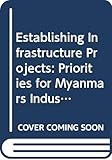Establishing Infrastructure Projects : Priorities for Myanmar’s Industrial Development — Part I: The Role of the Private Sector / Stuart Larkin.
Material type: TextPublisher: Singapore : ISEAS Publishing, [2014]Copyright date: 2014Description: 1 online resource (32 p.)Content type:
TextPublisher: Singapore : ISEAS Publishing, [2014]Copyright date: 2014Description: 1 online resource (32 p.)Content type: - 9789814620208
- 9789814620215
- 338.43363 L32
- HC422 .L37 2014
- online - DeGruyter
| Item type | Current library | Call number | URL | Status | Notes | Barcode | |
|---|---|---|---|---|---|---|---|
 eBook
eBook
|
Biblioteca "Angelicum" Pont. Univ. S.Tommaso d'Aquino Nuvola online | online - DeGruyter (Browse shelf(Opens below)) | Online access | Not for loan (Accesso limitato) | Accesso per gli utenti autorizzati / Access for authorized users | (dgr)9789814620215 |
Frontmatter -- FOREWORD -- EXECUTIVE SUMMARY -- INTRODUCTION -- INFRASTRUCTURE FINANCING -- LOCAL CONGLOMERATES AS PROJECT PROMOTERS IN MYANMAR -- CONCLUSION -- BIBLIOGRAPHY
restricted access online access with authorization star
http://purl.org/coar/access_right/c_16ec
The issue of establishing infrastructure projects for Myanmar's industrial development is addressed in two parts. Part I focuses on the role of the private sector, how Myanmar's conglomerates can take the lead on infrastructure development with financing from the new China-led multilateral development banks. Part II focuses on the role of the state. The government needs to work closely with the conglomerates and also adopt measures and policies that will facilitate this model of infrastructure development.Once Myanmar's tycoons fully take on board the new financing options available with the creation of the two new China-led multilateral development banks they could once again become more engaged with the domestic political class, particularly over the 2015 election period with its prospect of a change in the power configuration. They would have had several years of working on improving the operations of existing businesses, necessary for their continued prosperity under the more competitive economic conditions of the new Myanmar. But this experience will only serve to sharpen their yearning for doing the really big deals associated with operating infrastructure concessions where a very large scale, and an earnings stream shielded from competition for many years to come, are in prospect. The private sector should indeed take the lead in Myanmar's overall economic development. After all, Ne Wins socialism was a severe wrong turn for the country, largely responsible for leaving the country where it is now. But the secret source of the prosperous market economy could well be paradoxically a strong state. Talented political leadership and an established trend of strengthening state capacity, is necessary to utilize the power of private enterprise.
Mode of access: Internet via World Wide Web.
In English.
Description based on online resource; title from PDF title page (publisher's Web site, viewed 26. Aug 2024)


